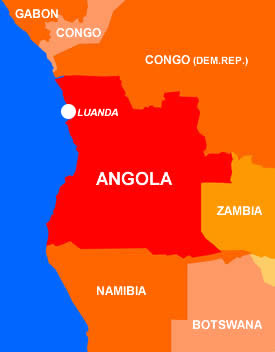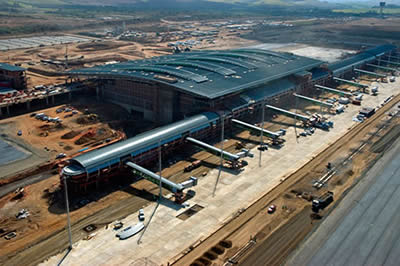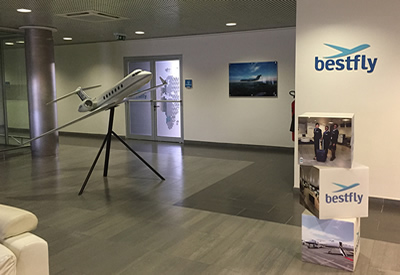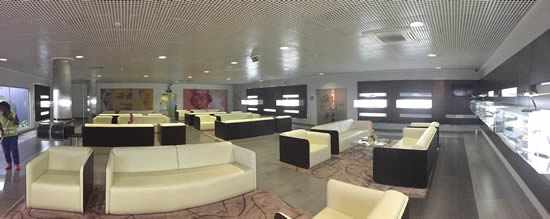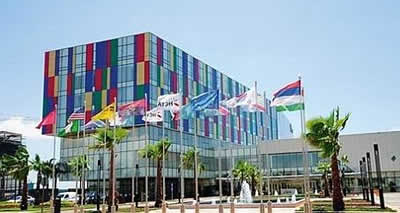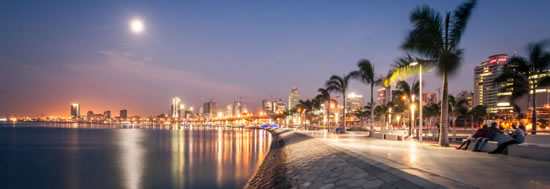| BlueSky Business Aviation News | |||||||||||||||||||
|
|||||||||||||||||||
Angola is a growing business aviation market that is advancing at a very fast pace, with many general aviation aircraft purchased by the countryís businessmen, and foreign aircraft increasingly operating to the country.
Airports The main international airport in Angola, and the commercial airport which is the hub of the national carrier TAAG Angola Airlines, is Luanda International Airport (FNLU / LAD).
Another important airport in the northwestern part of Angola where business aviation normally flies to is Cabinda (FNCA / CAB). FNCA operates from 0500 to 2300 local time. Operations at night is possible, but requires prior notification and arrangements. FNUB and FNGI are other main airports of entry in Angola. Landing Permit The authority responsible for issuing the landing permits in Angola is Instituto Nacional da Aviacao Civil (National Institute of Civil Aviation), normally abbreviated as INAVIC. The permit is required for all type of flights, even for private, technical stop and ambulance flights. The regulations in Angola necessitate that the permit request be applied through a local licensed agent. The landing permit is valid for 72 hours, which means that if a permit is issued for flight operation on Sunday, but the flight was not operated on that day, the aircraft can still operate until Wednesday without the need for permit revision, providing of course there is no change of route or aircraft. Any change in the route or the aircraft will require a revalidation of the permit, but the permit number will continue to be the same. Furthermore, INAVIC charges a civil aviation royalty for each passenger flying into and out of Angola, while the airport authority ENANA (Empressa Nacional de Exploracao de Aeroportos e Navegacao) charges a onetime fee. Cargo is subject to royalty as well. INAVIC requires the entity which obtained the landing permit to pay the royalty fee, and not the entity which provided the handling services. The lead time for issuance of landing permits in Angola is 72 hours. Experienced local agents who have good understanding of the regulatory requirements and good relationship with the civil aviation authority can get the permit at shorter times, at the discretion of the local authority of course. Permits over the weekends and the public holidays can be granted only for emergencies. Medical evacuation flights landing permit can be issued at 6 hoursí notice. Cargo flights normally take 7 days, as non-objection from the national carrier is required. When departing from Angola, itís not enough to file the flight plan through the AFTN communication network. There is a local procedure called flight dispatch requiring the flight plan to be filed locally, in order to make sure of the permit validity besides payment of all fees and royalties. Ground Handling Services The commercial ground handling company in the airports of Angola since 1997 is GHASSIST. Itís a company that is owned by three shareholders including TAAG Angola Airlines and ENANA.
Best Fly also has VIP lounges in Catumbela (FNCT / CBT), which operates from 0500 to 2300 and Lubango (FNUB / SDD).
Parking in Angola is normally decided by the airport authority ENANA and not the ground handling company. Luanda Airport will send a 'follow me' car which will guide the aircraft to the parking place assigned to the aircraft. Aviation Fuel Sonangol is the only fuel supplier and into-plane agent in Angola. Itís governmentally owned and operated. Sonangol does not accept fuel cards or credit cards. Payment of fuel is preferred to be done through a reseller who has a contract with Sonangol. JET A1 fuel is available in Angola with no shortage recently experienced, but AVGAS is not available. Fuel price is generally more expensive than other countries in Africa. In April 2015, under an agreement with Sonangol, Best Fly started operating its own dedicated fuel bowser for refueling executive aircraft at its FBO in FNLU. This will ensure faster turn-around time, as into-plane fueling by the FBO ensures better refueling process. Visa Most passengers, independent of their nationality, need a visa to enter Angola. If the passenger is not from a country that has a special agreement with the government of Angola, then the visa must be obtained from the Angola consulate in the passengerís country of residence, and canít be obtained upon arrival. Angolan consulates normally require the passengers to appear in person. As for the flight and cabin crew, irrespective of their nationality, they do not need visa to enter Angola. They can enter on General Declaration (GENDEC), providing they have a valid passport, they are in uniform, and holding their crew ID. The immigration authority in Angola will scan the crew passport and stamp the inbound GENDEC as the official document for crew stay while in Angola. When the crew leave Angola, they must show the stamped inbound GENDEC, and the immigration will keep it. Passports will be scanned again and given back to crew. HOTAC Hotels in Angola are expensive compared to other parts of the world, no wonder as Angolaís cost of living is one of the highest in Africa. You can expect to pay $400 to $500 per room per night including breakfast and tax for 4 and 5 stars hotels.
Chauffeured Transportation Although the security level in the country is improving, itís advised to avoid using public transportation and taxis while in Angola. Chauffeured transportation from recognized providers, the FBO or the hotels are recommended. Walking in public areas is not recommended, and itís best to consult with your hotel concierge or your private handler about areas to visit, and times of commute, besides time required to reach the airport to avoid traffic jam hours. Private security for aircraft, passengers, and secured transportation can be arranged, but itís normally expensive. Inflight Catering In 2012, the LSG Group, one of the largest providers of the inflight catering worldwide, opened a new catering facility in Luanda under the name of LSG Sky Chef. The company is a joint venture between LSG Group, TAAG Angola Airlines, Angola Air Catering and Luanda Airport Authority (ENANA). VIP Catering in other airports of Angola can be arranged from hotels. As Angola is located in the yellow fever endemic area, besides the wide spread of the malaria, itís recommended to take a vaccination for personal safety first, and because when flying out of Angola to some countries, entry will be conditional upon presenting vaccination certificates. Despite its year after year economic growth, there are still a long ways ahead of Angola to build its infrastructure, train its human resources, and improve the living conditions of the Angolans.
Angola might not be the place you feel thrilled to fly to, but the odds are high you will be flying there in the near future. If you plan the flight closely with your international flight support provider and local handler giving the mission the attention it requires, then the trip will run smoothly and will be a successful and pleasing experience for both the passengers and the crew. Dr. Adnan Branbo is the Chief Executive Officer of iJET, a flight support service provider based in Malta and Dubai. iJET services include over-flight and landing permits, credit ground support arrangements, and highly competitive aviation fuel. iJET network covers the world, through alliances and relationships with local agents and major suppliers around the world. Adnan can be reached at: adnan@ijet.aero Also in this series - Operating your Business Flight to: Qatar | Nigeria | Jordan | Algeria | UAE | Oman | Sri Lanka | Mauritius
|
|||||||||||||||||||

